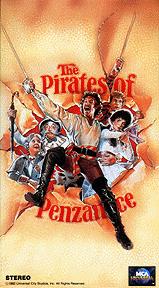Papp's Pirates (1980)
Director: Wilford Leach |
|
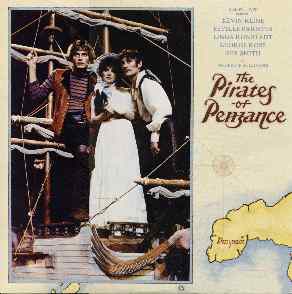 Electra VE-601 |
The late Joseph Papp was best known for the New York Shakespeare Festival, which he founded, but he was also a G&S lover. In 1980, to commemorate the centenary of The Pirates of Penzance (which had received its premiere in New York, the only G&S opera to do so), Papp mounted a souped-up, modernized version of the opera in Central Park. The show was a sensation, and Papp transferred it to the Broadway stage, where it ran for over 800 performances. It won Tony Awards for Best Revival, Best Director (Wilford Leach) and Best Actor (Kevin Kline). Linda Ronstadt was nominated for Best Actress in a Musical.
The production toured nationally, had a respectable run in London's West End, and was made into an unsuccessful movie. (Another film, The Pirate Movie, had nothing to do with Papp's production but was clearly inspired by the mania for Pirates that was then prevalent.)
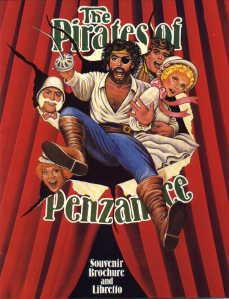 Papp's Pirates in London Tim Curry as The Pirate King |
The Papp production was much criticized in G&S circles. To make the opera more suitable for a Broadway audience, Papp's creative team wrote new orchestrations for a synthesizer-based orchestra. Musical tags were expanded or contracted, verses were transposed. The "fight scene" between the pirates and police (to which Sullivan had allotted only ten chords) was entirely rewritten. "Sorry her lot" from Pinafore was interpolated (to give rock star Linda Ronstadt another number to sing), as was a slightly-rewritten "My eyes are fully open" from Ruddigore. The Act II finale was restored to its first-night state. Liberties were taken with the dialogue too, though certainly not to the same degree as the music.
While the success of the Papp production is impossible to deny, some conservative G&S fans have asserted that a "traditional" Pirates could have enjoyed equal or greater success. I find this to be nothing more than wishful thinking, and there is certainly no historical evidence to back it up. Other fans say that this is simply not Gilbert and Sullivan, but an original musical by Joseph Papp loosely based on The Pirates of Penzance. I don't buy that, either. While there are plenty of liberties, this is an affectionate treatment by people who obviously love the opera. By and large, the audience is encouraged to laugh at Gilbert's humor, and to sing along with Sullivan's melodies. In this it is quite different from what is often called a "concept" production, in which the audience is asked to laugh at the director's jokes, not the author's. While I consider the producers' adaptations to have been completely necessary for the work to have enjoyed the commercial success that it did, this is still Gilbert's and Sullivan's opera through and through. I also believe that, were G&S themselves alive today, this is the kind of production they would probably be doing.
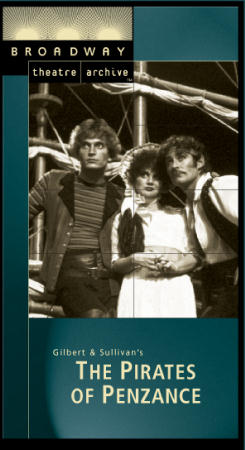 Sleeve of the Central Park Video, issued by the Broadway Theatre Archive |
Bruce Miller expressed similar admiration for what Papp achieved:
I find the Papp Pirates stage production to be highly respectful of the original. I do not agree with all of the decisions made in that production, but it remained remarkably faithful to the words and the music while giving a fresh perspective to the piece.
The musical arrangements, for example, changed some of the timbres so as to appeal to a rock-oriented public, and I personally would not have gone that way, but the original orchestral conceptions remained remarkably intact, and a great deal of reserach into Sullivan's original was done by the arranger. I am disappointed that so many subsequent productions have mindlessly copied some of the directorial schtick — I am so tired of the Keystone Kops turns in the second act — but in 1982 this was an inspired idea.
Right or wrong, the Papp's Pirates made a large splash in the early eighties, and many who would ultimately become G&S fans met their first acquaintance of the Savoy operas with this production. That the affection many had for Papp's version was transferrable to more traditional productions suggests, in my mind, that this version was far more respectful to the spirit (if not the letter) of G&S than many would care to admit.
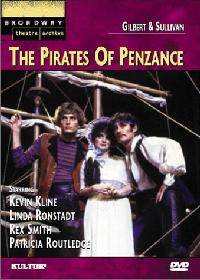 DVD of the Central Park production, issued by Kultur |
The production lives on, as amateur groups still rent Papp's revised libretto and orchestration, on occasion. The 1981 recording, recently re-issued on CD, is a successful recreation of what Papp's Pirates was all about, and I would cheerfully recommend it to all who have an open mind.
The Central Park Production
Although the most recently released, this is the earliest state of the Papp
Production available. It is an archival video of the original production at
the outdoor Delacorte Theater in New York's Central Park. As noted in the cast
list above, some of the performers are not the same as in the recording or the
video, although the only difference in a major role is that of Ruth. This version
is available, as far as I know, only through the
Broadway Theatre Archive. There
is some degredation in the quality of the video, but it is nevertheless emminently
watchable.
Dan Kravetz wrote:
The Broadway Theater Archive, which sells mostly on the Web, has released a complete performance of the Joseph Papp production of The Pirates of Penzance, taped live at the Delacorte Theater in Central Park, New York City, during the summer of 1980, available on VHS and in preparation on DVD. This video may have been taped to be shown on television, but was never broadcast, except possibly on the short-lived CBS Cable service over 20 years ago. The 1983 film version of the same production with essentially the same cast (of the leads, only Ruth is different, with Angela Lansbury replacing Patricia Routledge) is ruined by awkward, unneccesary cuts. The Delacorte video is the complete opera, in its early stages before many of the "traditional" silly bits evident in the film were established. Though it lacks the vivid color cinematography of the film (but is also in color), it conveys the spirit of the Papp production much more effectively — the excitement of the audience discovering Pirates as the splendid romp it is on a summer evening in New York, is obvious to the viewer at all times, whereas the film has a more contrived air about it. We still need a real 1880's-style Pirates on video as well as on stage (Papp's version has been copied far too often over the past two decades), but this important chapter in the history of G&S is too much fun to ignore — one can now understand better than ever what the fuss was all about.
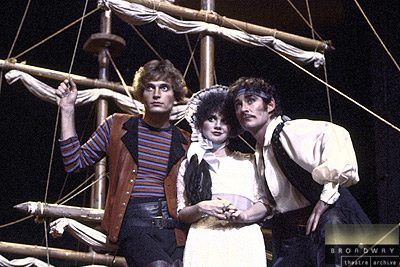 Rex Smith, Linda Ronstadt and Kevin Kline, in the familiar posed shot from the New York production. |
The Broadway Theatre Archive includes these comments from the original director, Wilford Leach:
"We treated Pirates as a new work," says Leach, "as something living rather than as something to be done correctly," with reverence toward the dead. We approached the production from the script itself, and from the music, rather than from the tradition of how it 'ought' to be done."
Along with limbering Pirates' joints, Leach loosened its vocal chords. "I wanted voices that had kept their individuality. And I like pop singers. That made Linda Ronstadt a natural. And the Gods were with us, because she had the voice and had wanted to be in Gilbert and Sullivan ever since sixth grade, when her older sister sang "Sorry Her Lot" from Pinafore. That's why we added that song to Act II.
"Frederic's role was the hardest to fill. We auditioned about 800 singers before someone suggested Rex Smith, whose forthright sincerity, good looks, personal warmth and musicianship were everything we had been looking for."
As for his partnership with Elliott and Daniele? "It's like dancing with someone and not knowing who's leading — we all knew the same thing at the same time without saying it."
One minor casting note: Alexandra Korey, who sang Edith on both the recording and the movie, is listed in the credits of the Central Park production as a "soloist," but as another artist is listed as Edith, it is not clear what Korey did. (I did not notice a split in the role of Edith, as is sometimes done, although I could have missed it.)
The Recording
After the Central Park production transferred to Broadway and was a smash
hit, the original cast recorded the show (with a different Ruth, but otherwise
the same artists in the major roles). The recording includes the dialogue and
is the most familiar version of the production. Careful listeners will detect
a few changes from the Central Park version, as the performers evidently (and
understandably) had evolved in their roles.
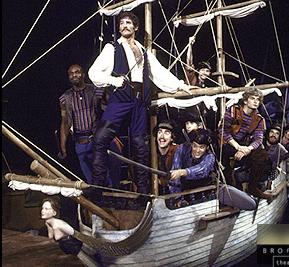 Kevin Kline leads the pirates onstage for their first entrance, from the original production. |
The Movie
It is remarkable that a production that achieved such notable success on
Broadway utterly flopped as a movie. To begin with, the producers
seriously misjudged the audience, scheduling the première as a
pay-per-view television event that sold poorly.
The film was then launched in commercial theaters without a prescreening
for reviewers — a clear sign that the studio knew they had a
failure on their hands. Its run was mercifully short.
The movie fails for a variety of reasons. The scenery is kitschy and cartoonish. The camera work is amateurish and constantly calls attention to itself. The characters' reactions are about twice too big, as if no one has told them that they're on a big screen and don't need to play to a Broadway theater balcony. At the end of the film, where the fight scene between the pirates and police would be, there is an over-long, irrelevant and completely unnecessary interpolated scene involving a romp through the town of Penzance and the invasion of a theatre in which an amateur production of Pinafore is playing. Overall, it is as if the creative team—the same folks that were responsible for the stage production—completely forgot the magic that made Papp's Pirates a success on Broadway to begin with.
Dan Kravetz embellished on the movie's problems:
There are really two issues involved. First, the Pirates film was not as good an adaptation of the Papp stage production as it could have been. The cuts were awkward and unnecessary — Pirates done complete (even with the two added songs from other G&S operas) would not have been an unusually long movie. The entire affair looked cheap — what came off as engagingly silly on stage seemed embarrassingly silly on film, because standard film production values were ignored. Fans of the Broadway show did not have much to cheer about when the film was released, except the oppotunity to see the Broadway stars' performances preserved. Many things that were done in the film were actually handled better cinematically in that other notorious film, The Pirate Movie. Seeing the policemen marching through the countryside in the latter film was much more impressive than anything in film of Pirates. Finally, the Papp stage show was geared to having an involved, live audience present to laugh, applaud or even sit quietly transfixed at different times during the show. All G&S operas work best in front of a live audience. When the same performers play the same production to cameras, it just doesn't work as well.
The second issue is how the Pirates film failed to engage audiences in general. For one thing, Pirates was not yet a "classic Broadway show" when the film came out in 1983. Thanks to Papp, it was on its way to that status, but it probably would have helped to wait a few years before releasing the film. Linda Rostadt and Rex Smith were no longer superstars of the type that would make pop music fans jam the theaters for chance to see them, and the new "experimental" work they were doing outside standard pop music did not necessarily cause their fans to follow them to the theater or the cinema. Film musicals had already been a dead art form for several years, no matter what legendary singers (including Streisand and Elvis) could be persuaded to appear in them. The music video was in its infancy and pop music fans were about to begin a new way of enjoying their idols on screen that had nothing to do with the old conventions of the feature film. There was also the deadly "G" rating. The Pirate Movie, as I recall, got a more attractive PG rating by changing the pirates' "Oh, dash it all!" to something stronger and by letting a pirate's spyglass experience a spontaneous change of length when he first sees the maidens through it.
So there are many reasons why the Pirates film did not succeed with theater buffs or film buffs, but it is extremely valuable as it lets us see Kevin Kline and George Rose performing at the peak of their careers.
[Note: Dan Kravetz wrote his review of the film before the original Central Park production was released on video. Now that that has happened, the importance of the film (as preserving the Papp production, even if in a flawed way), is significantly undermined.]
| Date | Label | Format | Number |
|---|---|---|---|
| 1981 | Electra | Stereo LP | VE-601 |
| Cassette | VC-601 | ||
| 1983 | MCA Videodisc Inc | Videodisc | 17-011 |
| 1984, 1988 | MCA Videocassette Inc | VHS NTSC | VHS 71012 |
| 1998 | Electra | CD | 7559-60586-2 |
| 2001 | Broadway Theatre Archive | VHS NTSC | [unnumbered] |
| 2002 | Kultur | DVD | B00006RCMW |
| 2010 | Universal | DVD | B00005JM6A |
